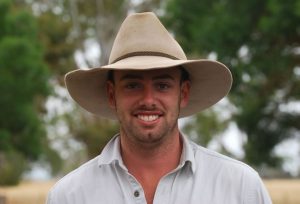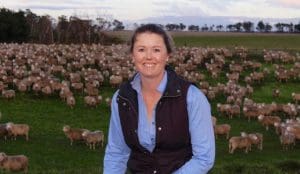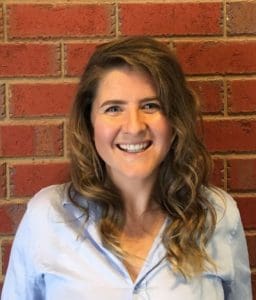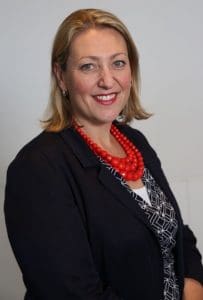
Culla livestock producer Anthony Close
WESTERN Victorian mixed livestock producer Anthony Close will look outside the sheep industry to investigate how the Merino could be great again.
The 26-year-old mixed livestock producer from Culla, Victoria, was awarded a 2019 Nuffield Farming Scholarship, with the support of Australian Wool Innovation, last night.
He will investigate ways the Merino sheep can again become a prominent feature of the Australian farming landscape to the background of a falling national ewe flock.
Anthony is one of 17 young Australians to be awarded their scholarships at the annual Nuffield National Conference dinner in Melbourne last night. Other 2019 scholars with a sheep or red meat focus will look at how the sector can retain and attract talent, and the impacts of climate change on red meat production and profitability in arid and semi-arid rangelands.
The Close family operation runs 7000 self-replacing Merino ewes to produce wool, prime lambs and rams. It also has a large commercial Red Angus herd and Red Angus and Senepol stud cattle.
The young farmer doesn’t believe the reduction in Australia’s sheep flock over the past 20 years is an economic issue.
“Benchmarking over the years shows that Merinos have stood up to cropping and beef, so it means it is something outside the economic side of it, which could be innovation or labour or the scaleability of sheep as well.”
“In 1992 the national sheep flock was 150 million head, and produced 4.75 million bales of wool.
“In 2018, the flock is 70 million head, and will produce two million bales,” Anthony said.
“Cropping, on the other hand, has grown from 12 million hectares planted to 19 million hectares planted.
“Given the impact that this reduction in flock numbers has on both sheep meat and wool production, it’s important to understand how we can reverse this downward trend in order to secure the sustainability and relevance of the industry,” he said.
Anthony said his family operation took advantage of the Merinos dual purposes for wool and lamb production and the security sheep income added. But he concedes it is harder and required more labour units to run a sheep flock than put in an extra couple of thousands of acres of crop in, needing only a few days on the air seeder or the header. Nevertheless, he wants to know why croppers will spend hundreds of thousands of dollars on a new header, but won’t buy a sheep handler.
Anthony’s research will take him to New Zealand, South Africa, Uruguay, the United Kingdom and the United States, but he will not only be interested in looking at sheep industries overseas.
In researching the range of factors that have caused the flock reduction, he will be looking for answers outside the sheep sector.
“I want to look at other industries, not necessarily around sheep, to see what drives a good industry.
“It is not necessarily all about sheep, it’s the bigger things as well.”
He will also be looking at industry structures that lead or drive vision, innovation and development.
Clare is all about attracting ag talent

Tasmania’s Clare Peltzer
Clare Peltzer from Evandale, Tasmania, received a Nuffield Scholarship supported by Meat & Livestock Australia. She will investigate how the agricultural sector can attract and retain the appropriate talent through better alignment with schools and ag-education programs.
The livestock manager at Logan, Evandale, oversees a prime lamb production system finishing the about 9600 lambs, mostly under irrigation. With a 7700 self-replacing ewe flock on 4250 hectares, the business is focussed on livestock management, genetics and marketing.
Outside the farm, Clare is also a part time secondary agriculture teacher at Scotch Oakburn College and has recognised the need for industry to have a stronger interface with schools to demonstrate a clear career path to attract and retain students in the agricultural sector.
“It’s time to rethink the agricultural workforce issue.
“Today, the range and number of jobs within farming has clearly surpassed the number of programs to attract students, so my research seeks to address how we can make that shift to realign these two co-dependent paths,” she said.
As part of her research, she plans to visit some of the leading agricultural universities in the world including Wageningen University, Netherlands; the University of California and Cornell University, Unites States; Agro ParisTech, France; and China Agricultural University, Beijing.
Climate change impact interests SA scholar

South Australia’s Ellen Litchield
Ellen Litchfield from Marree, South Australia, received a Nuffield Scholarship supported by Westpac Agribusiness. She will investigate the impacts of climate change on red meat production and profitability in arid and semi-arid rangelands.
Ellen is a third-generation farmer from the northern pastoral area of South Australia. Her family runs an organic production system with 5000 predominantly Angus cattle and 10,000 Dorper sheep .
Currently completing her master’s in sustainable agriculture, Ellen is passionate about bridging the knowledge gap between leading research institutions, producers and industry bodies on the effects of climate change, and delivering solutions for a stronger, more sustainable red meat sector.
“On farm, we face very unpredictable rainfall patterns which means innovation has to be a key part of our business.
“The effects of climate change are being realised and it’s becoming increasingly important to research ways of ensuring resilience in this changing environment,” she said.
“Through my Nuffield Scholarship, I hope to link in with the Australian Beef Sustainability Framework and focus on key priority areas such as consumer confidence, managing climate risk and profitability across the value chain, and deliver these findings to industry bodies and producers on my return.”
Ellen will also investigate the resilience of red meat producers against production barriers and how the industry’s journey towards a more sustainable future is being conveyed to the consumer in order to meet changing ideologies and demands.
She will travel to sub-Saharan Africa, which has a similar climate to northern South Australia, as well as the United States, Brazil and New Zealand, to investigate best practice examples across the red meat sector with a focus on organic production methods.
Sustainability a big focus of 2019 scholars

Nuffield CEO Jodie Dean
The 2019 Nuffield scholars will receive a $30,000 bursary to travel the globe to research cutting edge production techniques and technologies across a wide range of industries.
The 2019 cohort have selected wide ranging study topics, from regenerative practices in wine production and the impact of livestock wellbeing on productivity, to alternative fuel sources and energy solutions for Australia’s agricultural sector.
Nuffield chief executive officer Jodie Dean said the calibre of the 2019 scholars reflected the innovative spirit inherent in Australian agriculture amidst challenging seasonal conditions, and bucks the trend across many industries, with women making up most of the field.
“With the generous support of their investors, these scholars will be in a position to unearth some of the most exciting concepts, technologies and trends in global agriculture, and share their findings and insights with the wider industry once they return to Australia.
“There is a big focus on sustainability amongst our 2019 scholars, with research topics including ways to reduce plastic use in fresh produce packaging and the impacts of climate variability on the red meat sector,” she said.
“I believe this is indicative of their passion for the long-term viability of the industry.”
The 2019 Nuffield Scholars and their investors are:
Victoria
Natasha Shields from Baxter, supported by the William Buckland Foundation, will investigate alternative packaging options and shelf-life outcomes for organic fresh produce in the current drive to minimise the use of plastics in Australia’s retail environment.
Anthony Close from Culla, supported by AWI, will investigate ways that the Merino can once again become a prominent feature of the Australian farming landscape.
South Australia
Richard Leask from McLaren Vale, supported by Wine Australia, will research best practice regenerative farming systems across the wine sector to understand how to successfully transition to less chemically intensive models.
Thomas Green from Tintinara, supported by Rabobank, will research ways to build consumer confidence in intensive agricultural systems through the implementation of best practice in animal welfare.
Ellen Litchfield from Marree, supported by Westpac Agribusiness, will investigate the impacts of climate change on red meat production and profitability in arid and semi-arid rangelands.
Andrew Sargent from Crystal Brook, supported by the Grains Research & Development Corporation (GRDC), will investigate how farm sensors and the Internet of Things (IoT) can improve the efficiency and profitability of cropping and mixed farming enterprises.
New South Wales
Christina Kelman from Kemps Creek, supported by Hort Innovation, will investigate ways the Australian horticulture sector can increase outputs while reducing inputs and farming sustainably.
Thomas Moore from Tenterfield, supported by the Royal Agriculture Society of NSW Foundation (RASF), will investigate innovative housing methods to promote the growth of Australia’s free-range egg industry.
Queensland
Renée Anderson from Emerald, supported by Cotton Australia and the Cotton Research and Development Corporation (CRDC), will investigate management practices that improve the social, environmental and economic sustainability of agriculture, and communicate positive farming practices to consumers.
Rebecca Comiskey from Eidsvold, supported by The Yulgilbar Foundation, will investigate modern technologies that can be incorporated into beef production systems to increase the rate of genetic gain and enhance key profit drivers such as fertility, market compliance and production efficiencies.
Kerri-Ann Lamb from Killarney, supported by Hort Innovation, will investigate emerging trends, risks and opportunities in the fresh cut potato, sweet potato, onion and pumpkin market to determine what the industry should be doing now to prepare itself for the future.
Alistair Corr from Moura, supported collectively by Australian Agricultural Company, Consolidated Pastoral Company, Elders, North Australian Pastoral Company and S. Kidman & Co, will investigate the effect that a range of wellbeing factors before, during and after transport can have on the production value of cattle.
Tamara Uebergang from Miles, supported by the Sylvia and Charles Viertel Foundation, will investigate alternative fuel sources and energy solutions for Australia’s agricultural sector.
Northern Territory
Frank Miller from Rapid Creek, supported by ANZ and the Northern Territory Government, will investigate ways to realise the optimal value of Northern Australian timber investments.
Western Australia
Johanna Tomlinson from Kalgan, supported by the CBH Group, will investigate global soil and production management strategies with a focus on how soil acidity has become a significant threat to Western Australia’s broadacre industry.
Tasmania
Jake Newnham from Campania, supported by Woolworths, will investigate how to advance Australian cherry production, most notably post-harvest packaging and handling procedures.
Clare Peltzer from Evandale, supported by Meat & Livestock Australia, will investigate how the agricultural sector can attract and retain the appropriate talent through better alignment with schools and ag-education programs.

HAVE YOUR SAY